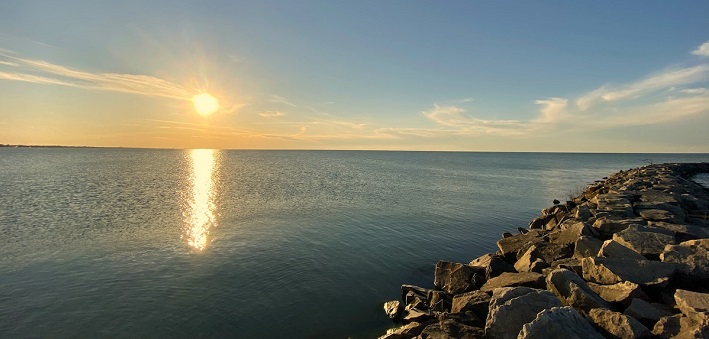Commentary on Luke 5:1-11
The themes in this text around trust, call, discipleship, abundance, discouragement, risk, and persistence are always relevant but have particular resonance during this challenging pandemic time.1
This text can be heard both as an acknowledgment of a time of emptiness and bleakness, as well as encouragement for discipleship and recognition of Jesus as the source of hope and abundance.
Scholars often identify the uniqueness of Luke’s narrative with respect to the other Synoptics. The immediate obedience of the disciples to Jesus in Matthew and Mark is not the emphasis here; this is not a call without context. In Luke, the call of these fishermen to discipleship comes in the midst of 1) learning from Jesus’s teaching and 2) witnessing the acts of God. Exploring this pattern has the potential to comfort and equip a community of hearers.
Like in the previous chapter, this text does not provide the substance of Jesus’s teaching. At this point in Luke, Jesus’s public ministry has included several references to his teaching, including his reading of Isaiah, but not long descriptions of his own content. The interplay between teaching and healing established in Chapter 4 continues here; the narrative underscores Jesus’s authority and popularity as teacher, piquing further interest in his ministry.
After he has finished instruction, Jesus shifts the conversation to focus on Simon and his nets, setting up the act of God. Simon’s reply acknowledges the reality of limits and scarcity, but also his willingness to listen and try again. Jesus’ mentioning of the “deep water” implies that there may be unexplored areas of potential beyond perceived limits of resources, knowledge, and energy. The response to this willingness is immediate; suddenly they have more fish than two boats can bear.
The act of God here is characterized by abundance and provision. A large catch of fish represents stability and care, support, and having enough. It is a physical manifestation of having one’s needs met. If this is where the text would have ended, that provision could have been the focus. It would have celebrated the receipt of daily bread, which is no small thing in that context or in this one. With so many facing food insecurity and a long winter still to come, the image of enough food, of provision and plenty, is compelling.
Further, the size of the catch indicates provision beyond the immediate moment. This is food enough to sell so that the fishermen will have resources beyond today. They can eat again tomorrow. And, the food that is sold becomes daily sustenance to others. So, while the large catch of fish conveys provision and plenty for Simon and his partners, it also signals a world beyond these fishermen and their immediate needs. The obvious surplus that can feed many more surpasses instinct or ability for hoarding or secrecy. The community is in view.
But our text continues beyond the large catch. Jesus, after providing the gift of plenty and even excess, tells the disciples that they are being called. In some ways, this call is similar to their present work; in others, it is different. The image of fishing is still used, but now it involves people. The climax of the story is the call, not the abundance. In their new role, the disciples will gather the people with the message from and about Jesus. They will follow him while leading and serving others.
Although not the focus, the themes of abundance and provision for the community—having enough—surround this new call. The metaphor of fishing for people remains problematic in our context and can be acknowledged as such. It is incongruous and raises questions in the hearer. What does this look like? How does it happen? These questions send the hearer both forward and backward, looking for answers and clarity. The sermon can guide this exploration, moving forward and backward to gain perspective. What do we already know about Jesus? And what do we learn later in the Luke about the way God works?
What do we know about Jesus that will give meaning to this call that comes not just to the first disciples, but to the weary ones in January 2021? The way the “fishing for people” unfolds in Luke’s Gospel is not coercive or domineering. It is personal, relational work—deep water work—where healing and plenty follow and mark the encounters of the disciples with Jesus and with God’s people. The interplay between teaching, healing, and call continues. Looking forward, there is death, and then resurrection.
Reminding the scattered community of this, the preacher can then orient them to their own future questions. What are we going to learn in the coming weeks and months about the way God works? Like the reference of Jesus’s teaching, this is not a question of content, but of faith. It invites the hearers to sharpen their focus and increase awareness, trusting that God will act. This focus on God’s nature and God’s action reminds the hearers of God’s provision and abundance, and also may open up local and contextual space for communities and individuals to identify the next opportunities to minister and serve.
Notes
- Commentary first published on this site on Jan. 24, 2021.


February 6, 2022